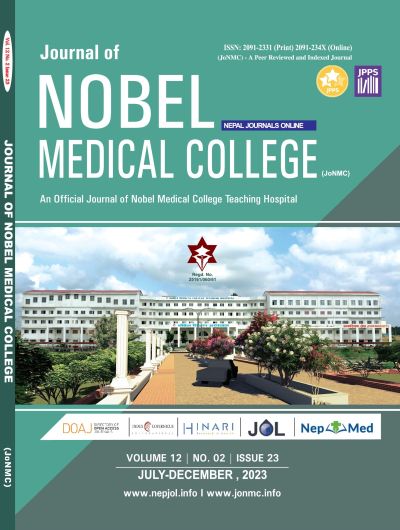Serum Procalcitonin as a Biomarker for Diagnosing Neonatal Sepsis in a Tertiary Care Hospital of Eastern Nepal
DOI:
https://doi.org/10.3126/jonmc.v12i2.61483Keywords:
Biomarker, Neonatal sepsis, Serum procalcitoninAbstract
Background: Sepsis is the main cause of morbidity and mortality in neonates. Early diagnosis and appropriate treatment can reduce the mortality rate. Blood culture is the gold standard for diagnosis of bacterial sepsis, but it requires 3-5 days for results. Since the disease may progress rapidly in neonates, a faster diagnostic test is needed. This study aimed to investigate and evaluate the role of serum procalcitonin as a marker for diagnosis of neonatal sepsis, aiming to enhance early detection and improve clinical outcomes.
Materials and Methods: This was a hospital-based cross-sectional observational study carried out in 350 neonates admitted with suspicion of neonatal sepsis in Neonatal Intensive Care Unit (NICU) of Nobel Medical College Teaching Hospital (NMCTH), Biratnagar, Nepal during 1 year between October 2021 to September 2022.
Results: The study included 350 cases, with a median age of 4days (1day to 4 days). Males made up the majority of cases (69.71%), as did Hindus (70.29%). Similarly, 78.86% of the cases had serum procalcitonin levels more than or equivalent to 0.5 ng/ml. Possible sepsis (43.43%) accounted for the majority of cases. The cases age, gender, and religion were shown to have a statistically significant relationship with serum procalcitonin.
Conclusion: Therefore, we draw the conclusion that serum procalcitonin may not be the only diagnostic marker to diagnose neonatal sepsis in term/near term newborns, but it may be helpful when paired with other test indicators.
Downloads
Downloads
Published
How to Cite
Issue
Section
License
Copyright (c) 2023 Arun Giri, Sunil Kumar Yadav, Vijay Kumar Sah, Amaresh Kumar Kushwaha

This work is licensed under a Creative Commons Attribution 4.0 International License.
JoNMC applies the Creative Commons Attribution (CC BY) license to works we publish. Under this license, authors retain ownership of the copyright for their content, but they allow anyone to download, reuse, reprint, modify, distribute and/or copy the content as long as the original authors and source are cited.




